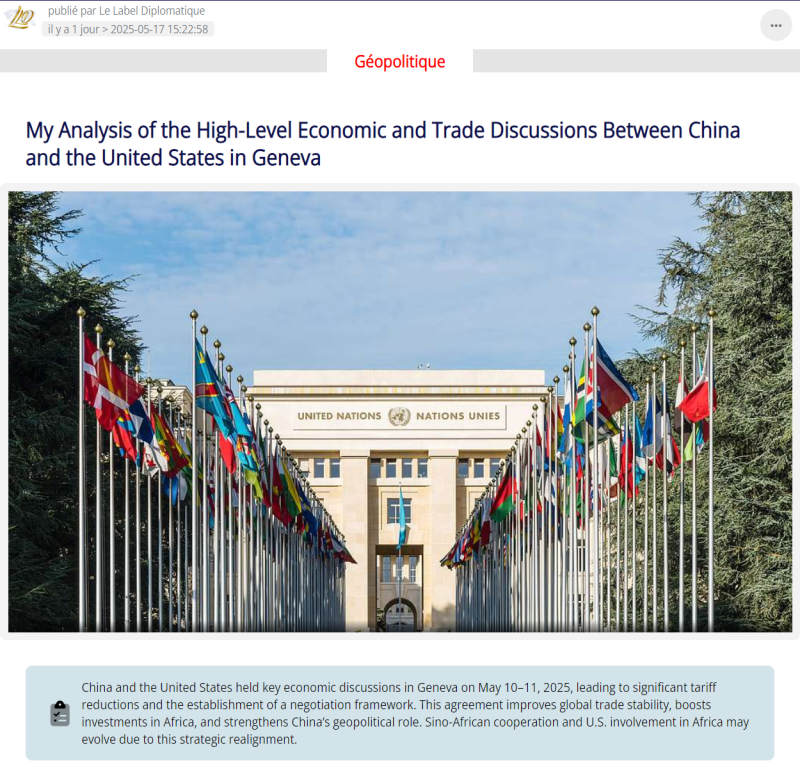It is good news that China and the United States held high-level economic and trade discussions in Geneva on May 10–11, 2025. This undoubtedly marks a significant step forward in easing trade tensions between the world's two superpowers. In terms of the scope of these discussions on bilateral and international trade, we can highlight tariff reductions and the establishment of a follow-up dialogue mechanism, as well as their impact on the global economy.
Specifically, regarding bilateral tariff reductions, China lowered its import tariffs on American goods from 125% to 10%, and the United States reduced its tariffs on Chinese products from 145% to 30%. These measures, set to take effect on May 14, 2025, for an initial 90-day period, send a positive signal for global trade. Furthermore, both countries concluded their discussions by establishing a new consultation framework to continue trade negotiations. This mechanism will be led by He Lifeng (Chinese Vice Premier), Scott Bessent (U.S. Secretary of the Treasury), and Jamieson Greer (U.S. Trade Representative). Meetings may take place alternately in China, the United States, or a third country.
This development has positively impacted financial markets:
- China: The Shanghai Composite closed up +2.4%, the Hang Seng surged +3.34%, and the Shenzhen Component rose +2.7%.
- United States: The S&P 500 climbed +1.8%, the Dow Jones gained +2.1%, and the Nasdaq advanced +1.5%.
- Europe: The CAC 40 in Paris increased by +1.4%, and the DAX in Frankfurt rose +1.62%.
- Oil Prices: These also went up, signaling renewed investor confidence.
Clearly, the Geneva discussions represent a de-escalation in the trade war that has disrupted bilateral exchanges for years. They could pave the way for a more comprehensive agreement, reducing economic tensions and facilitating international trade. They demonstrate both countries' commitment to preserving global economic stability, despite their differences.
In my view, the high-level economic and trade discussions in Geneva between China and the United States have indirect but significant implications for Sino-African cooperation, given the central role these two powers play in global trade and investments in Africa.
1. Effects on African Economies
- Many African economies rely on commodity exports, so a more stable global trade environment is beneficial for Africa.
- Lower tariffs between the U.S. and China may reduce disruptions in African markets, particularly for Chinese manufactured goods and African-exported resources.
2. Encouraging Chinese Investments in Africa
- If global economic conditions become more predictable, China may accelerate its investments in Africa, especially in infrastructure and industry.
- Chinese companies may expand their partnerships in Africa in a more favorable business climate.
3. Potential Diversification of Sino-African Trade
- If China needs to reorient its trade relations, it may strengthen exchanges with Africa to diversify its markets in response to potential future U.S. restrictions.
- Through FOCAC (Forum on China-Africa Cooperation), China-Africa cooperation could be expanded to compensate for Sino-American trade fluctuations.
4. Increased U.S. Economic Interest in Africa
- The normalization of U.S.-China relations may prompt the United States to enhance its own economic presence in Africa— potentially competing with China.
- Africa may benefit from renewed interest from both superpowers, stimulating trade and investment opportunities.
- This aligns with China’s long-standing commitment to fostering international cooperation that respects Africa's economic sovereignty.
In summary, Beijing-Washington negotiations indirectly yet clearly impact Africa, influencing trade flows, market stability, and Chinese (and possibly American) investments.
The Geneva negotiations between Beijing and Washington impact global cooperation and China’s role in international geopolitics in several ways:
1. Strengthening Global Trade Stability
- The reduction of tariffs between China and the U.S. could foster a more predictable economic climate, benefiting international trade.
- Financial markets have reacted positively, with notable index surges in China, the U.S., and Europe.
2. Reinforcing Multilateralism
- The establishment of a bilateral consultation mechanism may serve as a model for other international trade negotiations.
- This approach could encourage more balanced cooperation between major powers and emerging economies.
3. China’s Strategic Positioning on the Global Stage
- China has demonstrated its ability to negotiate on equal terms with the United States, solidifying its role as a leading global economic power.
- Beijing may leverage these advancements to strengthen alliances with other regions, particularly Africa, Latin America, and Eastern Europe—enhancing its geopolitical influence.
4. China’s Growing Influence in International Institutions
- Beijing could capitalize on these negotiations to promote a more inclusive economic governance model, particularly through platforms like BRICS and WTO.
- Its active engagement in resolving trade conflicts could further establish China as an international mediator.
My firm conviction is that these negotiations will impact the rebalancing of global economic relations, while cementing China’s position as a key player in international trade and diplomacy.
About the author:
Héribert-Label Adjovi, Editor-in-Chief of the Pan-African MagazineLe Label Diplomatique, President of the Pan-African Journalists Caucus. This article was culled from the website of the Pan-African MagazineLe Label Diplomatique, May 17, 2025.
